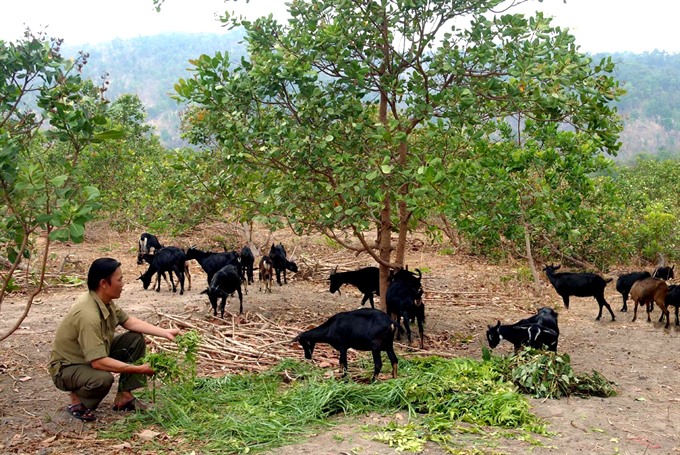 Society
Society

Internal migration to the Tây Nguyên (Central Highlands) region has caused population concerns, security, environment protection and hindered socio-economic development.
 |
| Goats are raised in a cashew forest in Đức Cơ Plantation in the Central Highland’s province of Gia Lai. — VNA/VNS Photo Sỹ Huynh |
TÂY NGUYÊN — Internal migration to the Tây Nguyên (Central Highlands) region has caused population concerns, security and environmental protection issues as well as hindering socio-economic development.
Since 1975, the region has always seen high population growth, the fastest increase in the country, Nông Thôn Ngày Nay (Countryside Today) newspaper reported.
In 1976, the population in the region was 1.23 million people with 18 ethnic groups (of which ethnic minorities accounted for 69.7 per cent).
By 2013, the population has reached six million with more than 50 ethnic groups.
According to Lê Văn Sơn, head of the Rural Economy Office, Co-operative Economy and Rural Development Department, the migrant households in the Central Highlands region come from many provinces across the country, mainly in the north.
“During the 12 years from 2005 to 2017, nearly 65,000 households migrated to the region with different ethnic groups such as Kinh people (48.5 per cent), Mông people (16.2 per cent), Tày people (6.4 per cent),” Sơn said.
“Among them, the Kinh immigrants account for largest proportion and mainly migrate to Lâm Đồng, Gia Lai and Kon Tum provinces. The Mông people mainly migrate to Đắk Lắk and Đắk Nông provinces.
“This situation has caused many complicated social problems, including the land disputes between the migrants and the local people, especially the local agriculture and forestry companies."
Tây Nguyên region, home to vast areas of land and forests, migrants move into natural and protected forests, encroaching on land for production or putting up tents illegally and causing increasing damage to forest land.
Some had damaged the vehicles of forest rangers and attacked them using homemade weapons, such as guns and spears.
This situation also disturbs the lives of the local people, and creates conditions for some bad people to incite others to disrupt order, affecting socio-economic development of localities, according to Sơn.
At the conference on policies and laws on migration organised by the Committee on Social Affairs of the National Assembly recently in Lâm Đồng Province, delegates suggested that the Government have solutions to limit and look at ending uncontrolled migration.
They also proposed the Government direct ministries to strengthen managing social order and safety on free migration areas and quickly deal with hot spots on land disputes, deforestation.
In particular, it is necessary to improve the responsibilities of the local authorities and people in implementing the task of population stabilisation.
Giàng A Chu, vice chairman of National Assembly’s Council of Ethnic Affairs, said authorities at all levels should have fundamental solutions, synchronous implementation, associated with managing, arranging and stabilising free migrants.
Chu said it was necessary to review the planning of population stabilisation projects based on the real situation of people’s lives and production in order to make appropriate adjustments.
In particular, land allocation should be prioritised to residents who have no land for producation instead of enterprises.
Sơn also said it is needed to develop production, improve living standards and address social welfare in order to stabilise the lives of migrants.
About 16,900ha of land from agricultural and forestry farms would be returned to the localities to settle for free migrant households by 2020, he said.
Cil Ha Drang, from People’s Council of Lâm Đồng Province, said in the period of 2005-17, the number of migrants to province was about 2,200 families.
They have contributed to exploitation and use of fallow land, developing production in the locality.
The province proposed authorised ministries allocate funds to start settlement projects, addressing the urgent needs and aspirations of the people.
At the national conference in Đắk Lắk recently, Prime Minister Nguyễn Xuân Phúc noted the consequences of unplanned migration such as negative impact on national defence, social welfare and security and order.
“The ultimate purpose is how to help migrants have stable lives and production, help their children go to school and make sure old people receive health check-ups and treatment, with no one left behind,” he said.
He set the target of putting an end to unplanned internal migration by 2025, stabilising the lives of disadvantaged households and completing 32 settlement projects.
The Government leader also requested provinces to improve the management of land originating from forestry farms, address the lack of productive land, control free emigration, maintain social order and security, and ensure the interests of the people. — VNS